Table of Contents
ToggleHome loan Vs mortgages are common ways to finance a home purchase. Both involve borrowing money, but they differ in purpose, collateral, interest rates, and application process. Knowing these differences is key to choosing the right option for your financial situation and homeownership goals. This guide will help you understand the definitions, types, and differences between home loans and mortgages.
Key Takeaways
- Home loans and mortgages are distinct financing options for purchasing a home, each with unique features and requirements.
- Home loans are specifically designed for buying, building, or substantially improving a primary residence, while mortgages can be used for various real estate investments.
- Mortgages typically require a higher down payment and have stricter collateral requirements compared to home loans.
- Interest rates and loan terms can vary significantly between home loans and mortgages, impacting the overall cost and repayment schedule.
- Understanding the key differences can help you choose the financing option that best aligns with your financial goals and homeownership objectives.
Understanding Home Loans
A home loan is a special kind of loan for buying or refinancing a home. It’s secured by the property, making it a safe investment for lenders. There are two main types: conventional loans and government-backed loans like FHA and VA loans.
Also Read : Freelancing Tips For Managing Client Relationships Successfully
What is a Home Loan?
A home loan, or mortgage, helps you buy or refinance a home. It’s secured by the property, acting as collateral. Home loans can also help you tap into your home’s equity with a home equity loan or home equity line of credit.
Types of Home Loans
There are many home loan types, each with its own benefits and needs. Here are a few:
- Conventional Home Loans: These loans come from private lenders like banks. They often need a good credit score and a big down payment.
- FHA Loans: Insured by the FHA, these loans help first-time and low-income buyers. They have easier requirements, like a smaller down payment.
- VA Loans: Guaranteed by the VA, these loans are for veterans and active-duty military. They offer no down payment and no PMI.
- Jumbo Loans: For expensive homes, jumbo loans are used. They require a high credit score, big down payment, and higher interest rates.
Choosing a home loan depends on your finances, credit score, and the home you want. Each loan has its pros and cons. It’s key to research and find the right one with a lender.
Also Read : Freelancing Skills: How To Build A Competitive Portfolio
Exploring Mortgages
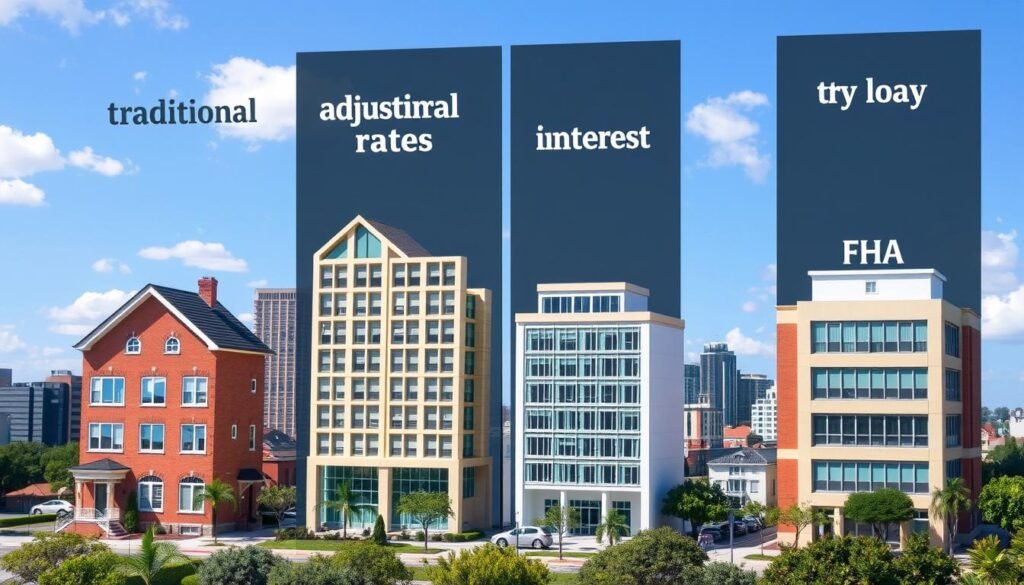
A mortgage is a loan for buying a home or real estate. It’s a secured loan, meaning the property is used as collateral. There are many types and terms of mortgages, each with its own features and considerations.
Definition of a Mortgage
A mortgage is a long-term loan for buying a home or real estate. The property is used as collateral. If the borrower can’t make payments, the lender can take the property.
Mortgage Types and Terms
- Conventional Mortgages: These are traditional, non-government-backed loans. They usually require a down payment of at least 20% of the home’s value.
- Government-Backed Mortgages: Loans like FHA and VA are insured or guaranteed by the government. They often have lower down payment requirements and less strict credit criteria.
- Adjustable-Rate Mortgages (ARMs): ARMs have interest rates that can change over time. This can lead to changes in the borrower’s monthly payments.
- Jumbo Mortgages: These loans are for high-value properties that exceed the limits set by Fannie Mae and Freddie Mac.
The most common mortgage terms are 15-year and 30-year fixed-rate mortgages. They offer predictable monthly payments over the loan’s life. Mortgages are usually repaid over the full term. The loan amount depends on the home’s value, the borrower’s credit score, and the down payment size.
Also Read : Insurance Innovations: How Technology Is Transforming Coverage
Homeowners can also use home equity loans or HELOCs to access their home’s equity. These are second mortgages.
| Mortgage Type | Description | Typical Down Payment | Loan Limits |
|---|---|---|---|
| Conventional Mortgage | Traditional, non-government-backed loan | 20% or more | Conforms to GSE limits |
| FHA Loan | Government-backed loan insured by the Federal Housing Administration | As low as 3.5% | Varies by location, typically $356,362 to $970,800 |
| VA Loan | Government-backed loan for military members and veterans | 0% | No limit, but subject to county-level conforming loan limits |
| Jumbo Mortgage | Loan used to finance high-value properties exceeding conforming loan limits | 20% or more | Exceeds conforming loan limits, typically $548,250 to $970,800 |
“Timing the sale of the current home with the purchase of a new one is crucial when upgrading, consider advancing the sale before buying a new home to free up equity and reduce financial strain.”
Also Read : The Role Of Insurance In Financial Security
Home Loan Vs Mortgage
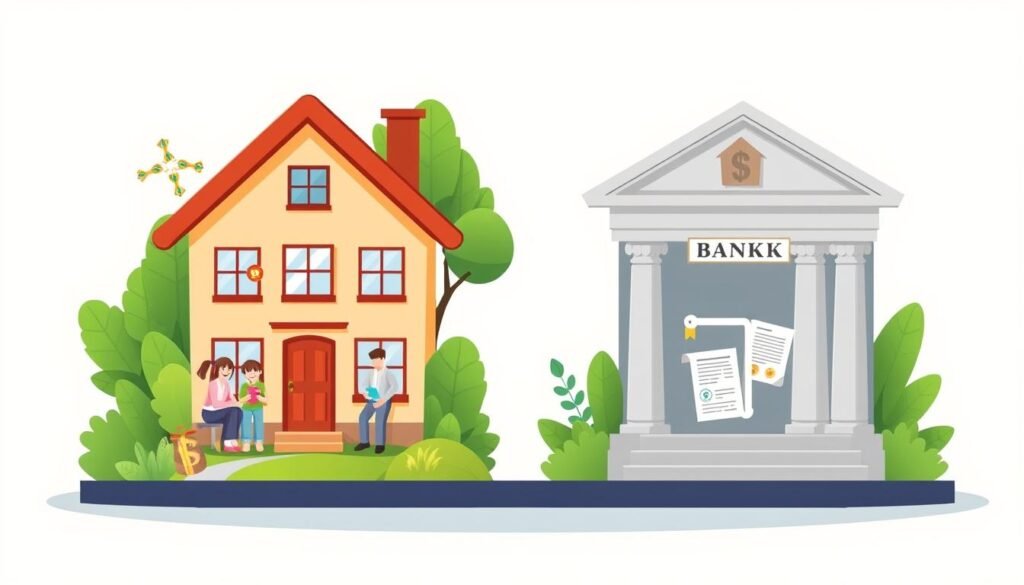
When you want to finance a home, you might choose between a home loan and a mortgage. These options seem similar but have big differences. These differences can really affect your journey to becoming a homeowner.
The main difference is in the purpose and use of the loan. A home loan is for buying a new home or refinancing an old one. A mortgage, however, is for buying real estate like a commercial property or investment property.
Another important difference is the collateral requirements. Home loans are secured by the property itself. Mortgages might need more, like a down payment or other assets.
Also, home loans and mortgages have different interest rates and fees. The average mortgage rate for a 30-year fixed mortgage is 6.95%. This is up from 6.75% last week. For a 15-year fixed mortgage, the rate is 6.07%, up 0.29 percentage points.
It’s key to understand these differences when choosing between a home loan and a mortgage. By looking at the purpose, collateral, interest rates, and fees, you can pick the best option. This choice will help you succeed in your real estate journey.
Also Read : Cyber Insurance: Protecting Your Business In The Digital Age
Key Differences Between Home Loans and Mortgages

When you’re looking to finance a home, knowing the difference between home loans and mortgages is key. The main differences are in their purpose, what you need to offer as collateral, and the interest rates and fees you’ll face.
Purpose and Use
Home loans are made for buying or refinancing a home, like a single-family house or condo. Mortgages, however, are for buying any kind of real estate, including commercial properties and land.
Collateral Requirements
Both home loans and mortgages use the property as collateral. But, the rules can vary. Home loans usually need the home as collateral. Mortgages might allow other assets too.
Interest Rates and Fees
The rates and fees for home loans and mortgages can be quite different. Home loans might offer better terms and lower costs because they focus on homes. Mortgages, covering more types of properties, might have higher rates and fees.
| Feature | Home Loan | Mortgage |
|---|---|---|
| Purpose | Residential property financing | Real estate purchase |
| Collateral | Home | Property or other assets |
| Interest Rates | Potentially lower | Potentially higher |
| Fees | May be lower | May be higher |
It’s important to understand these differences when choosing between a home loan and a mortgage. This helps you pick the best option for your needs and budget.
Factors to Consider When Choosing Between a Home Loan and Mortgage
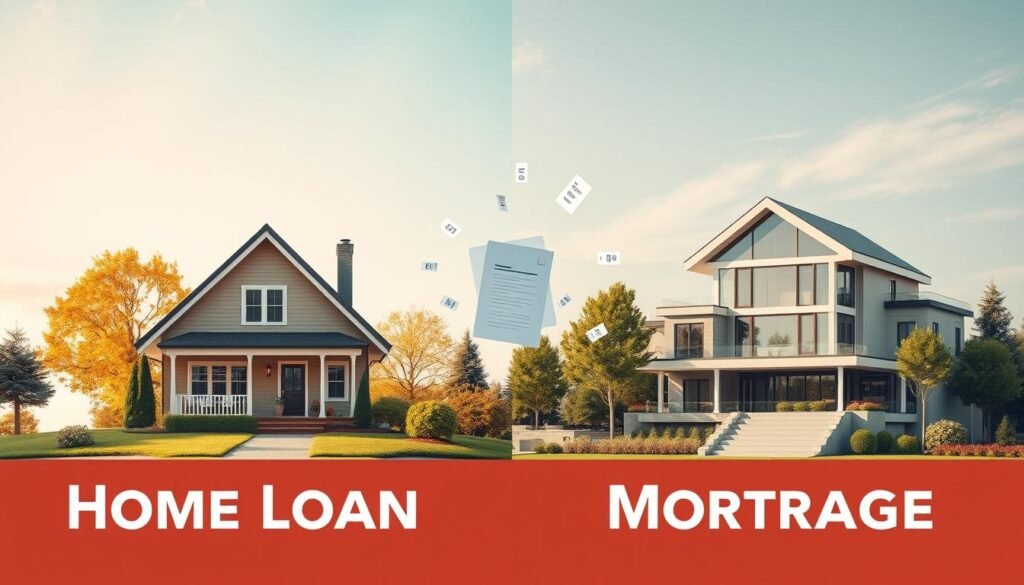
Choosing between a home loan and a mortgage requires careful thought. You need to look at your credit score, financial health, down payment, and closing costs. These elements greatly affect your loan eligibility and terms.
Credit Score and Financial Situation
Lenders often look for a credit score of 720 or more for better rates on mortgage loans. They also check your debt-to-income (DTI) ratio. It should be under 43% to show you can handle monthly payments.
Down Payment and Closing Costs
The down payment and closing costs are key. FHA loans are great for first-time buyers because they need less down. VA loans let veterans and active military buy homes with no down payment.
By weighing these factors, you can pick the loan that suits your goals and budget.
“Choosing the right financing option can make a significant difference in the long-term costs and sustainability of your homeownership journey.”
| Factor | Home Loan | Mortgage |
|---|---|---|
| Credit Score | Typically requires a score of 620 or higher | Typically requires a score of 720 or higher for lower interest rates |
| Debt-to-Income Ratio | Lenders prefer a DTI ratio below 43% | Lenders prefer a DTI ratio below 43% |
| Down Payment | Minimum 3.5% for FHA loans | Minimum 20% to avoid private mortgage insurance (PMI) |
| Closing Costs | Can be higher due to additional fees | Can be lower with certain loan programs |
Home Loan Vs Mortgage: Interest Rates and Loan Terms
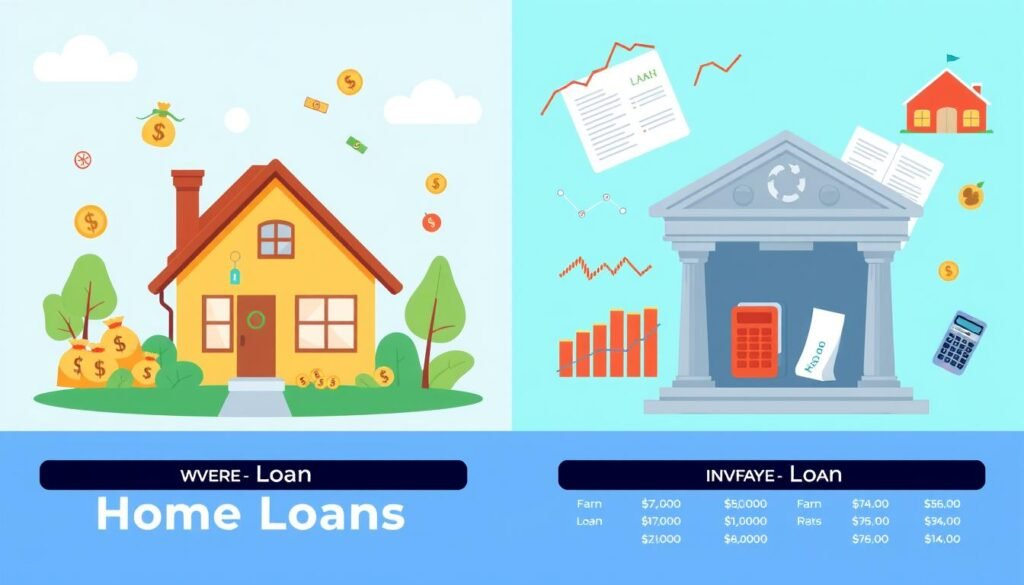
Choosing between a home loan and a mortgage affects your interest rates and loan terms. It’s important to understand these differences. This knowledge helps you pick the best option for your financial situation.
Fixed vs. Adjustable Rates
Home loans and mortgages come with either fixed-rate or adjustable-rate (ARM) options. Fixed-rate loans keep your interest rate the same for the loan’s life. Adjustable-rate loans start with lower rates but can change, leading to higher payments later.
| Loan Type | Term | Rates | APR* |
|---|---|---|---|
| Fixed-Rate Mortgage | 10 Year | As Low As 6.125% | As Low As 6.689% |
| Fixed-Rate Mortgage | 15 Year | As Low As 6.125% | As Low As 6.651% |
| Fixed-Rate Mortgage | 20 Year | As Low As 6.500% | As Low As 6.824% |
| Fixed-Rate Mortgage | 30 Year | As Low As 6.625% | As Low As 6.873% |
| FHA Rate Mortgage | 15 Year | As Low As 5.875% | As Low As 6.691% |
| FHA Rate Mortgage | 30 Year | As Low As 6.000% | As Low As 6.808% |
| FHA 203k 30 Year Mortgage | 30 Year | As Low As 6.000% | As Low As 6.808% |
Loan Repayment Period
Home loans and mortgages vary in repayment periods. 30-year and 15-year terms are common. Longer terms have lower monthly payments but more interest paid. Shorter terms have higher payments but less interest over time.
Understanding fixed vs. adjustable rates and repayment periods helps you choose wisely. This choice aligns with your financial goals and budget.
Qualifying for a Home Loan or Mortgage

Getting a home loan or mortgage requires knowing the key criteria. Lenders look at your income, employment history, and debt-to-income ratio. These factors help decide if you qualify and what interest rate you’ll get.
Income and Employment Requirements
Lenders want to see you have a steady income. They check for stable employment and prefer jobs you’ve had for at least two years. Most lenders want a minimum annual income of $40,000.
Debt-to-Income Ratio
Your debt-to-income ratio shows how much of your income goes to debt. Lenders aim for a ratio below 43%. A lower ratio can lead to better interest rates and loan terms.
Lenders also look at your credit score and overall financial situation. Knowing these requirements helps you prepare. It can improve your chances of getting the best loan for your home.
Advantages and Disadvantages of Home Loans and Mortgages
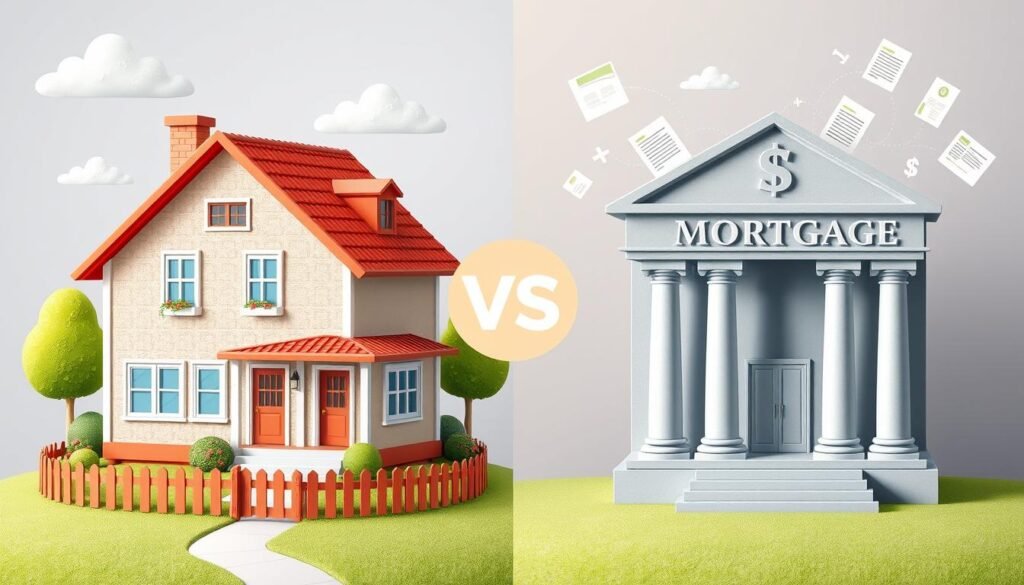
When you’re looking to buy a home or refinance, you have two main choices: home loans and mortgages. Each option has its own benefits and drawbacks. It’s important to think about these carefully before making a decision.
Advantages of Home Loans
- Home loans are made for buying homes and refinancing. They might offer better rates and lower fees.
- They often have shorter terms. This means you can pay off your loan faster and save on interest.
- Home loans are easier to get. They have less strict credit score and debt-to-income ratio rules.
Disadvantages of Home Loans
- Home loans might need a bigger down payment or more paperwork than mortgages.
- Their interest rates could be higher, especially for those with lower credit scores.
- They might have higher closing costs. This can increase the cost of owning a home.
Advantages of Mortgages
- Mortgages are just for buying real estate. They’re a more focused option.
- They have more flexible rules. You might need a smaller down payment and have a better credit score.
- Interest rates for mortgages can be lower, especially for those with great credit.
Disadvantages of Mortgages
- Mortgages usually have higher rates and costs. This includes origination fees and closing costs.
- They often have longer terms. This means you’ll pay more in interest over time.
- Mortgages are only for buying homes. They’re not as flexible as home loans.
The choice between a home loan and a mortgage depends on your financial situation and goals. Weighing the pros and cons of each can help you make the right choice for you.
| Feature | Home Loan | Mortgage |
|---|---|---|
| Purpose | Home purchases and refinancing | Real estate purchases |
| Interest Rates | Potentially lower | Potentially higher |
| Loan Terms | Shorter, up to 15 years | Longer, up to 30 years |
| Qualifying Requirements | Stricter | More lenient |
| Closing Costs | Higher | Lower |
Understanding the pros and cons of home loans and mortgages helps you choose the best option for your homeownership goals and financial situation.
The Application Process for Home Loans and Mortgages

Getting a home loan or mortgage means going through a detailed application process. You’ll need to share financial documents like tax returns, pay stubs, and bank statements. These show you can afford the loan. You might also get pre-approved or pre-qualified, which means the lender checks if you qualify for a loan.
Documentation Required
The documents needed for a home loan or mortgage can change based on the lender. But, you usually need:
- Tax returns for the past two to three years
- Pay stubs or proof of income for the past 30 days
- Bank statements for the past two to three months
- Proof of assets, like retirement accounts or investment portfolios
- Identification documents, such as a driver’s license or passport
- Social Security number
Pre-approval and Pre-qualification
Pre-approval and pre-qualification are key steps in the home loan or mortgage process. Pre-qualification is a quick check using basic info like income and credit score. It gives a rough idea of what you might qualify for.
Pre-approval is more detailed. You’ll need to submit financial documents and go through a hard credit check. Lenders will check your credit and offer a conditional approval for a loan amount and interest rate. Pre-approval letters are good for about 90 days and can make buying a home easier.
Knowing what documents you need and understanding pre-approval and pre-qualification can help. It makes the home loan or mortgage application process smoother. And it increases your chances of getting the financing you want.
Refinancing: When to Consider Home Loan or Mortgage Refinancing

Homeowners might find refinancing their home loan or mortgage a smart move. It could be to get lower interest rates, use home equity with a cash-out refinance, or change loan terms. Refinancing can bring big benefits.
One key reason for refinancing is to get a lower interest rate. This can save a lot of money over time by lowering monthly payments. You can also choose a shorter loan term to save on interest later, even if payments are a bit higher.
For homeowners who’ve paid off their mortgage, refinancing can be a good option. They can use a cash-out refinance to tap into their equity. This lets them get funds for investments or other financial goals. Rates for refinancing a paid-off mortgage are often lower, making borrowing more favorable.
| Refinancing Scenario | Potential Benefits |
|---|---|
| Lowering Interest Rates | Significant savings over the life of the loan |
| Accessing Home Equity | Unlock funds for investment or other financial goals |
| Changing Loan Terms | Adjust the repayment period to better suit your needs |
But, deciding to refinance needs careful thought. You should look at your current finances, mortgage rates, and future homeownership plans. Consider your credit score, debt-to-income ratio, and closing costs too.
Refinancing can be a great tool for homeowners. But, it’s crucial to think about the pros and cons to make sure it’s right for you.
Also Read : Home Loan Underwriting: Key Criteria Lenders Consider
Conclusion
Home loans and mortgages are similar but not the same. They serve different purposes and have different requirements. Knowing these differences is key to choosing the right option for you.
Things like your credit score, down payment, and debt-to-income ratio matter a lot. They can affect the loan you get and the terms you’ll have.
Looking at the pros and cons of each option helps you make a smart choice. This choice should match your financial goals and dreams of owning a home. It’s important to understand the main differences, like purpose, collateral, and interest rates.
Choosing between a home loan and a mortgage depends on your financial situation and needs. Understanding the factors that influence your decision is crucial. This article aims to help you make a confident choice for your financial well-being.
FAQs
Q: What is the difference between a home loan and a mortgage loan?
A: A home loan is a broader term that refers to any loan taken out to purchase a home, while a mortgage loan is a specific type of home loan that is secured by the property itself. The mortgage serves as collateral for the loan.
Q: What are the different types of loans available for home buying?
A: The main types of loans include fixed-rate mortgages, adjustable-rate mortgages, home equity loans, and home equity lines of credit. Each loan type has its own features and eligibility criteria.
Q: How do home equity loans and mortgages differ?
A: Home equity loans are taken out against the equity in your home and are typically used for home improvement or debt consolidation, while a mortgage is used to purchase the home itself. Home equity loans usually have a fixed interest rate.
Q: Can you explain the difference between a mortgage and a home equity line of credit?
A: A mortgage is a loan used to buy a home, whereas a home equity line of credit (HELOC) allows homeowners to borrow against the equity in their home as needed, usually with a variable interest rate.
Q: What does it mean to get a second mortgage?
A: A second mortgage is an additional loan taken out against the equity in your home while still having your primary mortgage. This type of loan can be used for various purposes, including home improvements or consolidating debt.
Q: How does the loan against property work?
A: A loan against property allows homeowners to borrow money by using their property as collateral. This can be used for various personal expenses, and the interest rates are generally lower than unsecured loans.
Q: What are the key factors to consider when choosing a mortgage type?
A: Key factors include the interest rate (fixed vs. adjustable), the length of the loan, the type of mortgage (conventional or government-backed), and your financial situation, including credit score and debt-to-income ratio.
Q: How can I understand the difference between a home equity loan and a mortgage?
A: To understand the difference, consider that a mortgage is primarily for purchasing a home, while a home equity loan leverages the equity built up in the home for other financial needs, often at a lower interest rate than personal loans.
Q: What should I know before getting a mortgage?
A: Before getting a mortgage, it’s essential to check your credit score, understand the different types of mortgage loans available, determine how much you can afford in monthly payments, and shop around for the best mortgage lender.
Q: What is the difference between a home loan and a mortgage loan?
A: A home loan is a broader term that refers to any loan taken out to buy a residential property, while a mortgage loan specifically refers to the loan secured by the property itself. Essentially, all mortgages are home loans, but not all home loans are mortgages.
Q: What type of loan is best for home improvement?
A: For home improvement, you may consider a home equity loan or a home equity line of credit (HELOC), as both options allow you to borrow against the equity in your home. Alternatively, you could also explore personal loans for smaller renovations.
Q: How do mortgage loans differ from home equity loans?
A: Mortgage loans are used to purchase a home, whereas home equity loans allow you to borrow against the equity in your home. Home equity loans typically have fixed interest rates and are used for large expenses, while mortgage loans are used to finance the initial purchase of a property.




